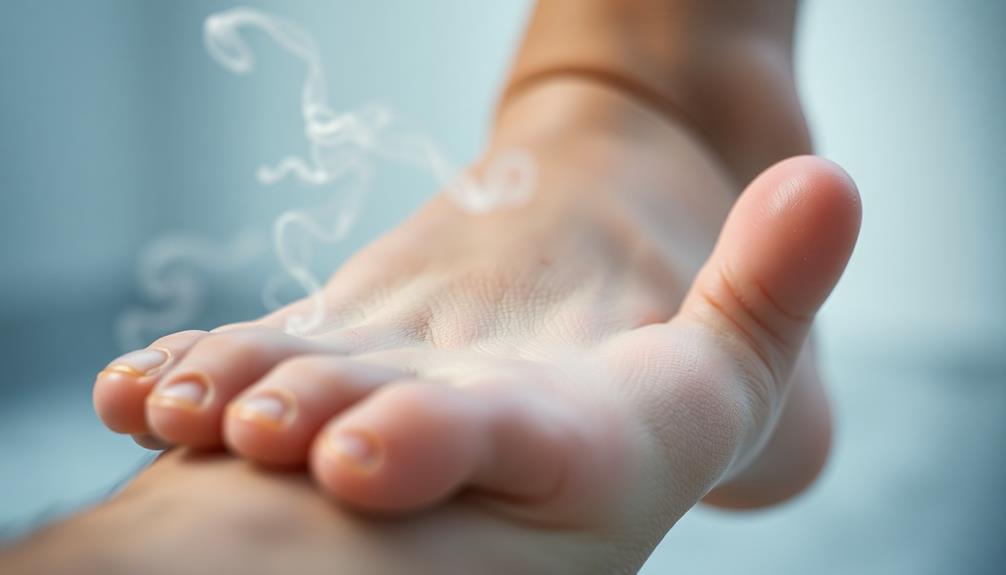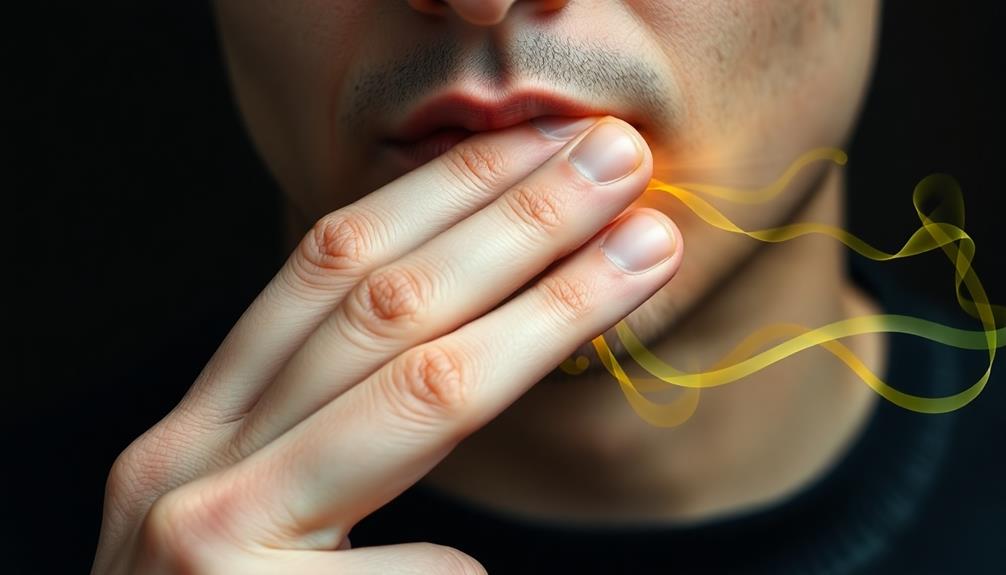People with diabetes may notice unique body odors due to high ketone levels. You might detect a fruity or sweet scent, especially if ketones are high, which can happen during conditions like diabetic ketoacidosis. This smell resembles acetone, similar to nail polish remover. Poor oral hygiene can worsen bad breath, adding to the odor. Stress, heat, or dehydration can make these smells stronger. It's important to monitor your blood sugar and stay hydrated, as changes in odor can signal health issues. Keep an eye on those scents, and you'll learn more about managing diabetes effectively!
Key Takeaways
- Diabetes-related body odor often has a fruity or sweet scent due to elevated ketone levels.
- An acetone-like smell, reminiscent of nail polish remover, can occur during high blood sugar episodes.
- A persistent ammonia-like odor may indicate kidney issues or dehydration in individuals with diabetes.
- Poor oral hygiene can exacerbate bad breath linked to elevated ketones, contributing to overall body odor.
- Monitoring blood sugar levels and maintaining good hydration are essential to manage these odors effectively.
Introduction

Managing diabetes involves more than just monitoring blood sugar levels; it can also affect how you smell. You might notice that your body odor changes due to high levels of ketones in your body. When your body produces too many ketones, especially during diabetic ketoacidosis, it can lead to a fruity smell, sometimes like rotten apples or pear drops. This is a sign of a serious metabolic imbalance that needs immediate attention.
Additionally, some people with diabetes experience an acetone-like smell, which is similar to nail polish remover. Uncontrolled diabetes can cause dry mouth, making bad breath more likely, which can contribute to an overall unpleasant smell.
Poor oral hygiene can worsen this, leading to a type of bad breath called halitosis, often described as "perio breath."
If you notice these changes, it's essential to take action. Keep an eye on your blood sugar levels, practice good oral hygiene, and consult your healthcare provider if you have concerns.
Understanding how diabetes can affect your body odor is a vital step in managing your health effectively!
Description of the Smell

When you experience changes in body odor due to diabetes, you might notice a distinct fruity or sweet scent, often compared to rotten apples or pear drops. This smell happens when your ketone levels rise, especially during diabetic ketoacidosis (DKA).
Alongside this fruity smell, you could also detect an acetonelike odor, similar to nail polish remover, as ketones escape through your breath and sweat.
The uniqueness of your body odor can change based on your blood sugar levels. If they're high, the scent might become stronger. In some cases, you might even notice an ammonia-like smell from your sweat, which could signal a serious issue with kidney function.
Additionally, poor oral hygiene can lead to halitosis, a type of bad breath that might've a distinct "perio breath" smell. This can contribute to your overall body odor, making it essential to maintain good dental care.
Source and Composition

High blood sugar can also lead to an increase in glucose in your saliva, which promotes the growth of odor-causing bacteria. This can result in a sweet or unusual body odor that's hard to ignore.
Additionally, if you notice ammonia-like odors, it might indicate issues with your kidney function or dehydration, as your body struggles to eliminate waste effectively.
Being aware of these specific odors is crucial for early detection of complications. If you notice any significant changes in your body odor, it's important to seek medical intervention right away.
Understanding the source and composition of diabetes-related body odor can help you manage your condition better and avoid potential health risks.
Typical Scenarios or Environments

Uncontrolled diabetes can lead to noticeable body odor in various scenarios. One common situation is during high-stress times or illness, where your blood sugar levels spike. You might notice a fruity scent emerging, especially if you have elevated ketones, which can indicate diabetic ketoacidosis (DKA).
In crowded or warm environments, increased sweating can make this distinctive body odor even more apparent to others. If you have poor oral hygiene, you may also experience bad breath that smells like rotten apples or nail polish remover. This unpleasant odor is another sign of those elevated ketones.
Environments that promote dehydration, like hot climates or during intense exercise, can worsen this situation. When you're dehydrated, your saliva production decreases, and your body excretes more ketones, amplifying the characteristic smell associated with diabetes.
Being aware of these typical environments can help you manage your diabetes better. If you find yourself in a situation where your body odor becomes noticeable, consider checking your blood sugar levels and staying hydrated.
This proactive approach can make a real difference in how you feel and how others perceive you!
Emotional or Cultural Associations

Body odor linked to diabetes, especially the fruity scent from diabetic ketoacidosis, can stir up feelings of concern and urgency. You might feel embarrassed or anxious about this odor, which can affect your mental health and social interactions.
When people notice a diabetes-related body odor, it may lead to stigma or misconceptions, causing you to withdraw socially and develop negative self-perception.
Cultural beliefs also play a big role in how you manage your diabetes. In some cultures, body odor can carry a negative stigma, and this might make you lean towards natural remedies instead of medical treatments, based on societal norms.
Understanding these emotional responses and cultural implications is crucial. By addressing them, you can create better support systems for yourself and others facing similar challenges.
It's essential to talk openly about these feelings and experiences. Sharing your story can help break down stigma and foster a sense of community.
Health or Safety Considerations

When managing diabetes, it's vital to pay attention to changes in your breath and body odor, as these can serve as important health indicators.
If you notice a fruity or sweet smell in your breath, it could mean your ketone levels are high, especially if you have diabetic ketoacidosis (DKA). This can be serious, so don't ignore it! An acetone-like scent, similar to nail polish remover, might indicate a lack of insulin or poor blood sugar control, which needs your attention.
Also, a persistent ammonia-like smell in your breath can signal kidney issues, more common in people with poorly managed diabetes. Regular monitoring of your breath and body odor helps catch these problems early.
To stay on top of your health, maintain good oral hygiene and stay hydrated. Drinking plenty of water can help reduce bad breath and body odor, lowering your risk of further health complications.
Always consult with your healthcare provider if you notice significant changes. Keeping an eye on these signs can help you manage your diabetes better and lead to a healthier life!
Final Thoughts

Managing diabetes involves not just monitoring blood sugar levels but also being aware of the subtle signs your body gives you, like changes in odor. Recognizing these unique body odors can be vital for your health.
For instance, a fruity smell often indicates diabetic ketoacidosis (DKA), which means high levels of ketones in your blood. This smell can resemble rotten apples or nail polish remover due to acetone being released in your breath and sweat.
Additionally, you might notice ammonia-like odors, especially if you're dehydrated or have kidney issues, which can be more common in people with diabetes.
Bad breath is another concern, often resulting from poor oral hygiene and the growth of sulfur-producing bacteria, leading to unpleasant smells.
Frequently Asked Questions
Do Diabetics Have a Distinct Body Odor?
Yes, diabetics can have a distinct body odor. This odor may vary, often described as fruity or sweet, and is linked to how your body processes sugar and fat, especially when insulin levels are low.
What Does Thyroid Sweat Smell Like?
Thyroid sweat can smell musty or fishy, especially if you have hyperthyroidism. Increased sweating and hormonal imbalances affect your sweat's composition, leading to a stronger odor as it interacts with skin bacteria. Regular management helps.
Can You Smell Pre-Diabetes?
You might not notice a distinct smell with pre-diabetes, but subtle changes in body odor can occur as insulin resistance develops. Keeping an eye on any shifts in scent could signal metabolic issues. As insulin resistance progresses, some individuals with pre-diabetes may notice unusual body odors due to the body’s difficulty in processing sugars effectively. In some cases, this can result in an alcohol odor seeping through pores, which is a sign that the body is resorting to alternative pathways to break down glucose. If you detect such odors, it’s important to consult a healthcare professional, as it could indicate worsening metabolic health that requires intervention.
How Do You Know if You Smell Bad to Others?
To know if you smell bad to others, ask a trusted friend for their honest opinion. Regularly check your skin and clothing after activity, and pay attention to people's reactions when you're around them.









